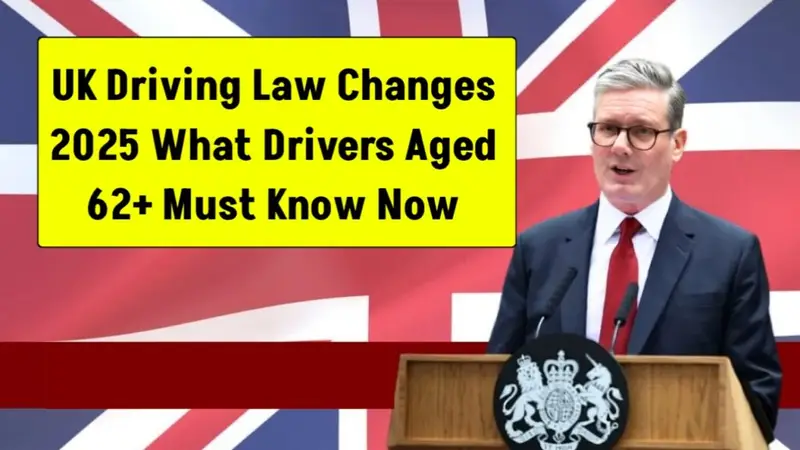The year 2025 is bringing significant updates to UK driving laws, and many of these changes will directly impact drivers aged 62 and above. From licence renewal rules to health checks and emission regulations, the government is tightening the framework to ensure road safety and environmental compliance. If you are an older driver in the UK, understanding these changes now will help you prepare and avoid unexpected issues on the road.
Licence Renewal Changes for Older Drivers
Starting in 2025, the DVLA will introduce new requirements for drivers over 62 when renewing their licences. While the general renewal age remains 70, those aged 62 and above will now be subject to earlier medical checks if they have certain health conditions such as poor eyesight, diabetes, or cardiovascular problems. The aim is to identify potential risks earlier and ensure safe driving. Renewal applications may also require more detailed medical reports from GPs, and processing times could be slightly longer than before.
Stricter Medical Reporting Rules
From August 2025, the medical self-assessment form will become more detailed. Drivers over 62 will be asked additional questions about mobility, vision, and reaction times. If any concerns are flagged, the DVLA may request a formal assessment from an optician or a medical professional before approving the renewal. Failure to declare a medical condition that affects driving could result in fines of up to £1,000 and possible licence revocation.
Eye Test Requirements
Vision is one of the most important safety factors for drivers. The 2025 changes will make it mandatory for all drivers aged 62 and above to undergo a professional eye examination at least once every three years. Proof of a recent eye test will need to be submitted during the licence renewal process. Those found to have substandard vision will be required to wear corrective lenses or may face driving restrictions.
Speed Limit Enforcement Updates
Speed limits in some areas, particularly residential and school zones, will be reduced further in 2025. Older drivers should be aware of these changes to avoid accidental violations. Additionally, new digital speed cameras will be rolled out across the UK, with a particular focus on rural roads where accident rates are higher. These devices are capable of detecting multiple offences at once, including speeding, mobile phone use, and seatbelt violations.
Changes to Insurance Premiums
Insurance providers are expected to adjust their policies to reflect the new regulations. For drivers aged 62+, premiums may vary based on updated risk assessments. Maintaining a clean driving record, completing refresher courses, and proving good health could help reduce costs. Some insurers will also offer discounts to older drivers who agree to install telematics devices that monitor driving behaviour.
New Vehicle Emission Rules
The UK’s push towards net-zero emissions will continue in 2025 with stricter rules on vehicle emissions. Drivers using older petrol or diesel cars may face higher congestion charges in low-emission zones (LEZs) and ultra-low emission zones (ULEZs). These zones will expand to cover more towns and cities, meaning older drivers who regularly travel to urban areas may need to consider upgrading to hybrid or electric vehicles.
Digital Driving Licences
A major digital transformation is set to arrive in 2025 with the introduction of optional digital driving licences. Drivers aged 62 and above will still be able to use physical licences, but those comfortable with technology may opt for a secure digital version stored on a smartphone. This could speed up identity checks and renewals, although basic digital literacy will be necessary to use the system effectively.
Mandatory Refresher Courses
While not compulsory for all drivers, local councils will begin offering subsidised refresher courses for those aged 62+. These short courses focus on modern road rules, safe driving techniques, and vehicle maintenance tips. Participating in such a programme could help drivers maintain confidence, update their skills, and potentially lower insurance premiums.
Penalties for Non-Compliance
With stricter laws in place, penalties for non-compliance will also increase. Driving without declaring a relevant medical condition, failing to renew on time, or ignoring new emission rules could lead to hefty fines, penalty points, or even licence suspension. Older drivers should pay close attention to official DVLA notifications to avoid any unintentional breaches.
Preparing for the Changes
If you are aged 62 or above, now is the time to get ready for these updates. Schedule an eye test, check your medical records, and ensure your vehicle meets emission standards. Consider upgrading to a newer, cleaner car if you frequently travel through low-emission zones. Staying informed and proactive will help you adapt to the new requirements without stress.
Impact on Rural Drivers
For those living in rural areas, some changes may feel more challenging. Limited access to public transport means older drivers often rely heavily on their vehicles. The expansion of speed cameras and potential emission zone boundaries may require extra planning for longer journeys. However, local councils are expected to provide additional guidance and possible exemptions in certain cases.
Financial Assistance Options
Upgrading to an electric or hybrid vehicle can be expensive, but several grants and incentives will remain available in 2025. The UK government’s plug-in car grant, discounted home charging point installations, and reduced road tax for low-emission vehicles are all designed to ease the financial burden. Pensioners should explore these options before making a purchase.
Staying Updated
The DVLA and Department for Transport will publish official updates throughout the year. Subscribing to email alerts or checking the government website regularly can ensure you don’t miss important announcements. News outlets and motoring organisations like the AA and RAC will also provide summaries of any last-minute changes.
Conclusion
The UK driving law changes in 2025 are aimed at improving road safety, adapting to environmental goals, and ensuring older drivers remain confident and capable on the roads. For drivers aged 62 and above, these updates bring both new responsibilities and opportunities. By staying informed, completing required checks, and adapting to modern driving standards, you can continue enjoying the freedom of the road for many years to come.

